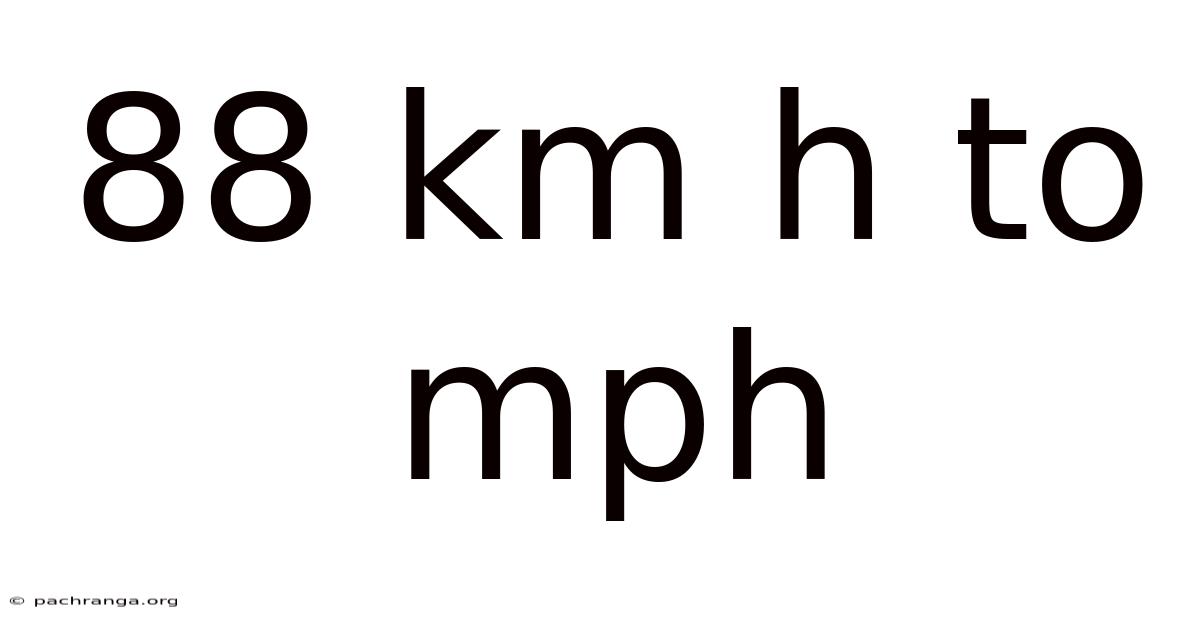88 Km H To Mph
pachranga
Sep 11, 2025 · 5 min read

Table of Contents
Converting 88 km/h to mph: A Comprehensive Guide
Are you wondering how fast 88 kilometers per hour (km/h) is in miles per hour (mph)? This seemingly simple conversion is a fundamental concept in understanding speed and distance, cropping up frequently in everyday life, from checking your car's speedometer to understanding international speed limits. This comprehensive guide will not only show you how to convert 88 km/h to mph but also delve into the underlying principles, explore different methods of conversion, and address common questions surrounding unit conversions.
Understanding the Units: km/h and mph
Before diving into the conversion, let's clarify what each unit represents.
-
km/h (kilometers per hour): This is a metric unit of speed, representing the distance traveled in kilometers within one hour. The metric system is widely used globally, particularly in scientific contexts and many countries.
-
mph (miles per hour): This is an imperial unit of speed, indicating the distance covered in miles within one hour. The imperial system is predominantly used in the United States and a few other countries.
The need to convert between these units arises from the coexistence of both systems, necessitating a clear understanding of the conversion factor.
Method 1: Using the Conversion Factor
The most straightforward method involves using the conversion factor between kilometers and miles. One kilometer is approximately equal to 0.621371 miles. Therefore, to convert 88 km/h to mph, we multiply the speed in km/h by this factor:
88 km/h * 0.621371 miles/km ≈ 54.68 mph
Therefore, 88 km/h is approximately equal to 54.68 mph.
Method 2: Step-by-Step Conversion
This method breaks down the conversion into smaller, more manageable steps, making it easier to understand the process.
-
Convert kilometers to miles: We start by converting the kilometers to miles using the conversion factor: 88 km * 0.621371 miles/km ≈ 54.68 miles
-
Maintain the time unit: The time unit (hours) remains unchanged throughout the conversion.
-
Express the speed: Combining the converted distance and the time unit, we obtain the speed in mph: 54.68 miles/hour or 54.68 mph
Method 3: Using Online Converters
Numerous online converters are available that can instantly perform this conversion. Simply input the value in km/h, select the desired output unit (mph), and the converter will provide the result. While convenient, it's crucial to understand the underlying mathematical principles to ensure accurate interpretation of results and to handle conversions beyond simple scenarios.
Understanding the Approximation
It's important to note that the conversion often results in an approximate value. The conversion factor (0.621371) itself is an approximation, as the relationship between kilometers and miles is not exactly a whole number. For most practical purposes, the approximation is sufficient. However, for applications requiring high precision, more decimal places in the conversion factor should be used.
Beyond the Conversion: Practical Applications
Understanding the conversion between km/h and mph is crucial in numerous real-world scenarios:
-
International Travel: When traveling internationally, familiarity with both unit systems is essential for interpreting speed limits, distance markers, and vehicle speedometers.
-
Automotive Industry: The automotive industry uses both unit systems, especially in global markets. Understanding the conversion is vital for design specifications, testing, and marketing materials.
-
Aviation: In aviation, understanding speed conversions is critical for air traffic control, flight planning, and ensuring safety.
-
Sports and Athletics: Many sporting events involve speeds measured in both km/h and mph, depending on the region and governing body.
-
Scientific Research: Conversions between units are fundamental in scientific calculations and data analysis across various disciplines.
Frequently Asked Questions (FAQ)
Q1: Is there a precise conversion factor between km/h and mph?
A1: No, the conversion factor is an approximation. The exact relationship between kilometers and miles is irrational. However, using more decimal places in the conversion factor improves accuracy.
Q2: Can I convert mph to km/h?
A2: Yes. To convert mph to km/h, use the inverse of the km/h to mph conversion factor, which is approximately 1.60934. Multiply the speed in mph by this factor to get the speed in km/h.
Q3: Why are there two different unit systems for speed?
A3: The existence of both metric (km/h) and imperial (mph) unit systems is a historical artifact. While the metric system is increasingly dominant globally, the imperial system persists in some regions.
Q4: Are there other units of speed?
A4: Yes, many other units of speed exist, including meters per second (m/s), feet per second (ft/s), knots, and Mach numbers (for speeds related to the speed of sound).
Q5: How do I convert 88 km/h to meters per second (m/s)?
A5: To convert 88 km/h to m/s, first convert kilometers to meters (multiply by 1000) and hours to seconds (multiply by 3600). Therefore: 88 km/h * (1000 m/km) / (3600 s/h) ≈ 24.44 m/s
Conclusion
Converting 88 km/h to mph is a relatively simple process that involves multiplying the speed in km/h by the appropriate conversion factor (approximately 0.621371). This conversion is crucial for understanding speeds across different units and is applicable in various fields, from everyday driving to scientific research. This guide provides multiple methods to perform this conversion, emphasizes the importance of understanding the underlying principles, and addresses frequently asked questions to solidify your understanding of this fundamental concept. Remember to always choose the level of precision appropriate for the given context.
Latest Posts
Related Post
Thank you for visiting our website which covers about 88 Km H To Mph . We hope the information provided has been useful to you. Feel free to contact us if you have any questions or need further assistance. See you next time and don't miss to bookmark.